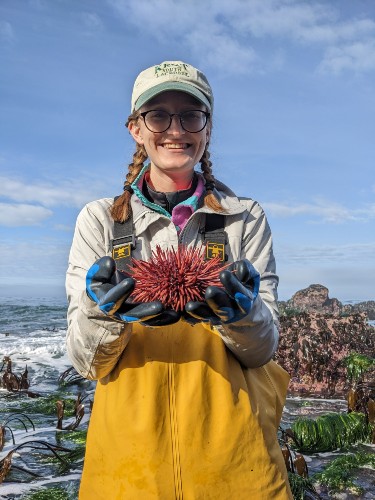Hello everyone!
I will start off with an introduction. My name is Megan Davis, and I am a second year Ph.D. student in the Menge Lubchenco Lab at Oregon State University. I am broadly interested in the science-policy interface as it relates to the ways in which humans use marine space, from marine protection to energy production to aquaculture. For the past few months, I have had the incredible opportunity to witness how science informs policy (and vice versa) at the state level as the 2022-2023 Oregon Sea Grant Legislative Fellow, working with the Coastal Caucus.

Credit: Delaney Chabot
For those of you who have not interacted with this group before, the Coastal Caucus is a bipartisan, bicameral group of legislators that represent the Oregon coast. To put it a bit more plainly (because I certainly did not know what bicameral meant when I first applied for this position), that means that this group is composed of members from both parties from both the Senate and the House. This session, the Coastal Caucus is chaired by Representative David Gomberg (D, House District 10). The Caucus also consists of its Vice Chair, Senator Dick Anderson (R, Senate District 5), as well as Senator Brock Smith (R, Senate District 1), Senator Suzanne Weber (R, Senate District 16), Representative Boomer Wright (R, House District 9), Representative Cyrus Javadi (R, House District 32), and Representative Court Boice (R, House District 1). As the Oregon Sea Grant Legislative Fellow, I provide technical expertise on marine and coastal issues to the Caucus members and act as a resource for communication with coastal constituents and key stakeholder groups.
Together, the Coastal Caucus forms a powerful coalition that collectively ensures that marine and coastal issues receive adequate attention at the State level. Much of the strength of this group is derived from the bipartisan nature of the Caucus. When all these legislators come together to support an issue, it signals that it has broad support along the coast and, often, across Oregon. This is the case with Oregon’s marine reserves. This session, the Coastal Caucus put forth HB 2903, which is a fantastic example of how science can be harnessed to inform policy. This past week, I had the pleasure of joining Representative Gomberg and Charlie Plybon (a fixture in Oregon’s marine reserves community) to speak to this bill at the Marine Reserves Celebratory Summit (hosted by The Nature Conservancy and facilitated by Sea & Shore Solutions). I would like to share with you what we discussed at the Summit.
In 2012, Oregon completed the planning and designation of five marine reserves: Cape Falcon, Cascade Head, Otter Rock, Cape Perpetua, and Redfish Rocks. The implementation and management of these reserves is led by the Oregon Department of Fish and Wildlife (ODFW) based on standards established in HB 3013 (2009), SB 1510 (2012), and related administrative rules. As the state’s first long-term, nearshore ocean conservation and monitoring program, Oregon’s marine reserves system has been instrumental in tracking and understanding how our marine ecosystems are changing over time, informing policy and management decisions at the state level. It also represents the first comprehensive human dimensions research program focused on examining the economic, social, and cultural dynamics of the Oregon coast and coastal communities.
On top of establishing the reserves, SB 1510 required that an internal (ODFW) and external (Oregon State University) decadal assessment of the marine reserves be carried out in 2022. These rigorous scientific assessments resulted in a series of legislative and administrative recommendations:
- that appropriate funds be allocated to ODFW to continue the Marine Reserves program at the necessary capacity;
- that a mandate that supports the development of an Adaptive Management Plan for the ongoing management and evaluation of the program be provided; and
- that a detailed, collaborative process through which social monitoring data can be interpreted to affect policy decisions be defined.
For an extra layer of legitimacy, these recommendations were then endorsed by the Ocean Policy Advisory Council, the original stakeholder and government policy forum for marine reserves and protected areas in the State of Oregon. Those recommendations were then presented to the Coastal Caucus, who built HB 2903 around them. To paraphrase Charlie Plybon, that’s not just incorporating science into policy, that’s inking science into policy.
So where is HB 2903 now? The bill made its way out of its first Committee (the House Committee on Agriculture, Land Use, Natural Resources, and Water) and now sits in the Joint Committee on Ways and Means, which is essentially that State’s budgetary committee. Once the State’s revenue forecast is released in mid-May, the Joint Committee on Ways and Means will determine how funds will be distributed to bills with associated fiscal asks, like HB 2903. Available funds are anticipated to be a bit tight this session, but the Coastal Caucus has put their full weight behind this bill, even making HB 2903 one of their priority fiscal asks for this session.
I have been so inspired by the legislators working to take this science-based policy from bill to law, and by all of the scientists, decisionmakers, and advocates who have put in over a decade of work to make Oregon’s Marine Reserves Program the success it is today. I’m excited to continue to work on this topic, both in the context of my fellowship and my dissertation. I will be checking back in (hopefully with an HB 2903 update) at the end of June!

Credit: Duncan Berry

